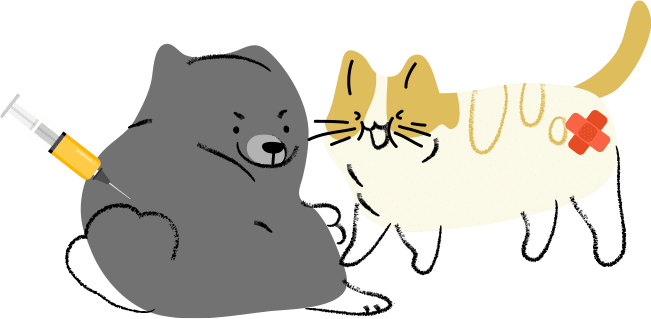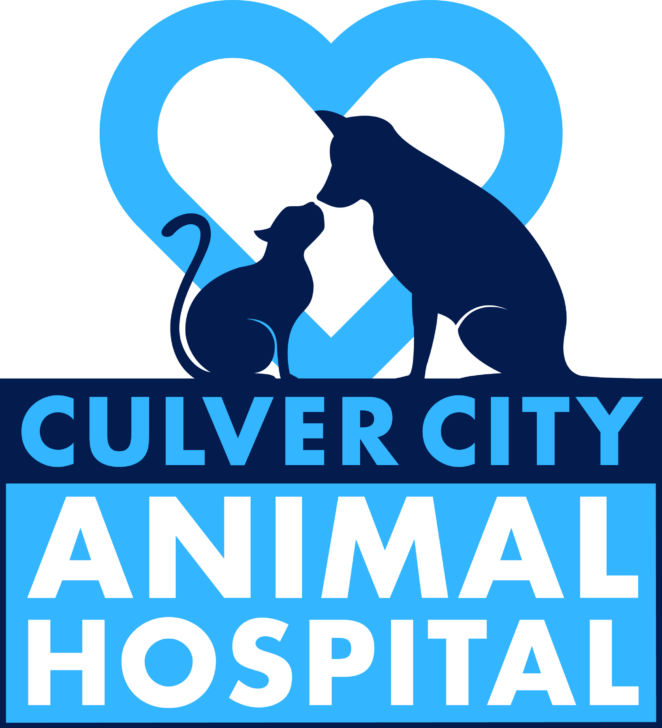
VACCINATIONS FOR PETS IN CULVER CITY
Vaccines are one of the most important preventative measures you can take for your dog or cat’s long term health. They help protect your pet from serious and fatal diseases, while reducing the spread of these illnesses to other animals and people.
Unfortunately, not all pet owners are aware of the importance of regularly vaccinating their pets. This lack of awareness can lead to higher risks of avoidable illnesses in both pets and their human family members.
At Culver City Animal Hospital, our team takes a tailored approach to each pet’s individual vaccine needs based on age, lifestyle, overall health, and requirements of local ordinances (such as for rabies vaccines). We provide a comprehensive selection of vaccines designed to keep pets healthy now—and in the future.
How Vaccines Work
Vaccines work by introducing a weakened form of the same virus or disease that would otherwise cause serious illness in your pet. As this “weak” virus enters their body, it prompts their immune system to respond and create antibodies against the actual virus should they come into contact with it in the future.
This immunity helps protect dogs and cats from certain illnesses, including rabies, distemper, parvovirus, and more.
Core Vaccines for Dogs
Core vaccines are those that are recommended by veterinarians for all dogs. This includes:
- Rabies
- Feline Panleukopenia Virus (FPV)
- Feline Calicivirus (FCV)
- Feline Herpesvirus Type 1 (FHV1)
Core Vaccines for Cats
Core vaccines for cats are recommended by veterinarians for all cats and include:
- Rabies
- Feline Panleukopenia Virus (FPV)
- Feline Calicivirus (FCV)
- Feline Herpesvirus Type 1 (FHV1)
Non-core Vaccines for Dogs
Non-core vaccines are those that may be tailored to the individual pet based on their lifestyle and overall health. These vaccines may include:
- Bordetella (kennel cough)
- Canine Influenza Virus (CIV)
- Leptospirosis
- Lyme Disease
Non-core Vaccines for Cats
Similarly, non-core vaccines may be recommended on a case-by-case basis for cats. These may include:
- Feline Leukemia Virus (FeLV)
- Chlamydophila felis
- Bordetella bronchiseptica
Frequently Asked Questions about Pet Vaccines
How often does my pet need vaccinations?
The frequency of vaccinations for your pet depends on several factors such as their age, lifestyle, overall health, and the specific vaccine in question. As a general rule, puppies and kittens require a series of vaccines in their first year of life, and adult dogs and cats typically receive vaccine boosters every 1-3 years. However, it’s best to discuss your pet’s specific vaccination schedule with our veterinary team to ensure they’re receiving the best care for their individual needs.
Will my pet experience pain from the vaccine?
Vaccines are generally not painful, and most pets experience little more than a slight pinch when they receive the needle. In some cases, side effects such as itchiness or swelling can occur at the injection site but will usually resolve on their own. If you’re concerned about your pet’s reaction to the vaccine, please don’t hesitate to reach out to our veterinary team. Our knowledgeable staff will be happy to help you with any questions or concerns you may have.
How can I provide proof of rabies vaccination for my local ordinance?
Our veterinary team will provide documentation of proof of vaccination for any local ordinances that may require it. This can usually be done in the form of a physical or digital copy of your pet’s vaccination records and also a rabies tag.
Are vaccines expensive?
Benjamin Franklin is attributed with having stated, “An ounce of prevention is worth a pound of cure,” and this is especially true when it comes to vaccinations for your pet. Most vaccines are very affordable, with some costing as little as $20. Vaccines provide an essential layer of protection against illnesses that could otherwise be much more expensive to treat if not prevented in the first place.
At Culver City Animal Hospital, our goal is to ensure that your pet receives the best possible care and protection from serious and fatal diseases. To learn more about our vaccination options, please contact us today! We look forward to helping your pet.
Vaccinations

Vaccines are one of the most important preventative measures you can take for your dog or cat’s long term health. They help protect your pet from serious and fatal diseases, while reducing the spread of these illnesses to other animals and people.
Unfortunately, not all pet owners are aware of the importance of regularly vaccinating their pets. This lack of awareness can lead to higher risks of avoidable illnesses in both pets and their human family members.
At Culver City Animal Hospital, our team takes a tailored approach to each pet’s individual vaccine needs based on age, lifestyle, overall health, and requirements of local ordinances (such as for rabies vaccines). We provide a comprehensive selection of vaccines designed to keep pets healthy now—and in the future.
How Vaccines Work
Vaccines work by introducing a weakened form of the same virus or disease that would otherwise cause serious illness in your pet. As this “weak” virus enters their body, it prompts their immune system to respond and create antibodies against the actual virus should they come into contact with it in the future.
This immunity helps protect dogs and cats from certain illnesses, including rabies, distemper, parvovirus, and more.
Core Vaccines for Dogs
Core vaccines are those that are recommended by veterinarians for all dogs. This includes:
- Rabies
- Bordatella
- Canine Influenza
- DHLPP
Core Vaccines for Cats
Core vaccines for cats are recommended by veterinarians for all cats and include:
- Rabies
- Feline Panleukopenia Virus (FPV)
- Feline Calicivirus (FCV)
- Feline Herpesvirus Type 1 (FHV1)
Non-core Vaccines for Dogs
Non-core vaccines are those that may be tailored to the individual pet based on their lifestyle and overall health. These vaccines may include:
- Bordetella (kennel cough)
- Canine Influenza Virus (CIV)
- Lyme Disease
Non-core Vaccines for Cats
Similarly, non-core vaccines may be recommended on a case-by-case basis for cats. These may include:
- Feline Leukemia Virus (FeLV)
- Chlamydophila felis
Frequently Asked Questions about Pet Vaccines
How often does my pet need vaccinations?
The frequency of vaccinations for your pet depends on several factors such as their age, lifestyle, overall health, and the specific vaccine in question. As a general rule, puppies and kittens require a series of vaccines in their first year of life, and adult dogs and cats typically receive vaccine boosters every 1-3 years. However, it’s best to discuss your pet’s specific vaccination schedule with our veterinary team to ensure they’re receiving the best care for their individual needs.
Will my pet experience pain from the vaccine?
Vaccines are generally not painful, and most pets experience little more than a slight pinch when they receive the needle. In some cases, side effects such as itchiness or swelling can occur at the injection site but will usually resolve on their own. If you’re concerned about your pet’s reaction to the vaccine, please don’t hesitate to reach out to our veterinary team. Our knowledgeable staff will be happy to help you with any questions or concerns you may have.
How can I provide proof of rabies vaccination for my local ordinance?
Our veterinary team will provide documentation of proof of vaccination for any local ordinances that may require it. This can usually be done in the form of a physical or digital copy of your pet’s vaccination records and also a rabies tag.
At Culver City Animal Hospital, our goal is to ensure that your pet receives the best possible care and protection from serious and fatal diseases. To learn more about our vaccination options, please contact us today! We look forward to helping your pet.
